Welcome to this column dedicated to my appreciation of physical media supplements called: Feature Presentations. The goal of this column is not to say whether a film is good or bad and worth picking up or not—I would like to highlight the discs that go the extra mile and provide film fans with enough tasty tidbits to satisfy even the hungriest of cinephiles. Today’s article will focus on Hard Times, The Driver, The Long Riders, Extreme Prejudice, Johnny Handsome, and Broken Trail from the Directed by… Walter Hill box set from Imprint Films.
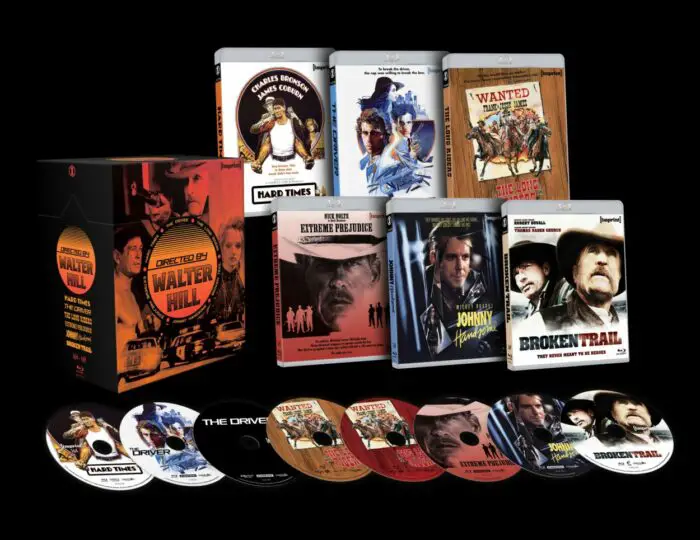
I never have been or will claim to be an expert in reviewing the technical specs of a physical media release. There are plenty of knowledgeable people in this realm of commenting on the audio and video aspects of a disc with better setups than I’ll ever own. This column, Feature Presentations, is a way of highlighting the supplemental material within a given disc. With all that out of the way, let’s get to the good stuff and dive into my review of this box set.
As a disclaimer of transparency for this episode of Feature Presentations, my review of the Directed by… Walter Hill collection comes from a review copy that Imprint Films provided for review. All thoughts and opinions are my own.
Walter Hill is a maverick director with a signature style whose films exude a don’t give an F attitude, somewhat akin to Sam Peckinpah’s works. And it’s only fitting the pair crossed paths multiple times, with Hill mentioning that Peckinpah helped influence him. And it’s not hard to see. Hill’s and Peckinpah’s films have influences of Westerns, with tough guys (and, on occasion, girls) fighting through impossible situations where violence is usually the only outcome.
Whereas Peckinpah accrued a reputation for a raucous set and unpredictable cuts of films, Hill excelled at crafting gritty stories for a mainstream audience. Never straying too far from his Western sensibilities, whether 48 Hrs, HBO’s Deadwood, or Hill’s latest, 2022’s Dead for a Dollar, Hill’s down-and-gritty vibe has continued through his 50-plus year career. As Joe Bob Briggs once said about Hill when showing The Warriors on TNT’s MonsterVision: “He makes guy movies…He makes tough films about tough guys.”
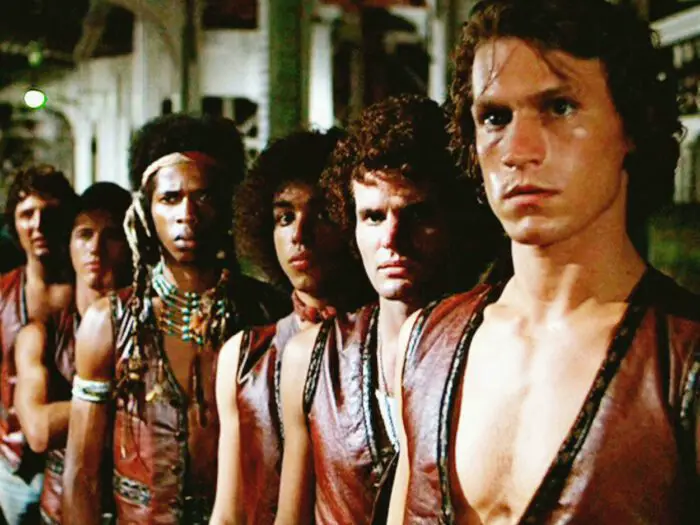
And Joe Bob’s assessment is correct, in a sense. Walter Hill films never leave characters longing for what could have been or a couple out on their first flirtatious dalliance with one another. It’s not his style. Just because romantic moments are few and far between doesn’t mean the gals are uninvited to the rough-and-tumble nature of what the director conjures up. And there’s no better place to dig into Walter Hill’s filmography than Imprint Films‘ six-film collection, Directed by… Walter Hill.
I’ve written in-depth about my love and affection for the box sets that Imprint Films has released over the past few years. Whether it’s films from Volume One and Volume Two of their neo-noir collections or their treatment with Walter Hill’s The Warriors, for my money, Imprint Films is a boutique label that knows how to cater to the physical media crowd.
When Imprint Films announced this collection over a year ago, it set the world of physical media collectors into a tizzy, myself included. Offering up a delectable grouping of Walter Hill’s lesser-known films in a luscious hard-box collection, I couldn’t wait to get my hands on the set. Then, things went radio silent for months. It almost felt like the set would never get released, but good things come to those who wait, and those who waited patiently got rewarded handsomely.
One thing I do need to address before I dive into the films and the supplied extras is that some movies in the set are limited in the supplemental material department. As I dedicate this column to reviewing the extra features, highlighting a handful of the films at a time into a more condensed review is most sensical.
Starting from the top, Walter Hill storms out of the gate with his debut film, the 1975 drama Hard Times, starring two of Hollywood’s toughest tough guys: Charles Bronson and James Coburn. I’ve spoken before about how I’m not a fan of Charles Bronson; something about his tough guy persona never clicked with me. And while Hard Times doesn’t sway my opinion that much, the film uses his persona well and might be his best performance. The film lets Bronson lean into his macho persona, but Hill and the additional screenwriters, Bryan Gindoff and Bruce Henstell; give just enough to let him flex his acting chops.
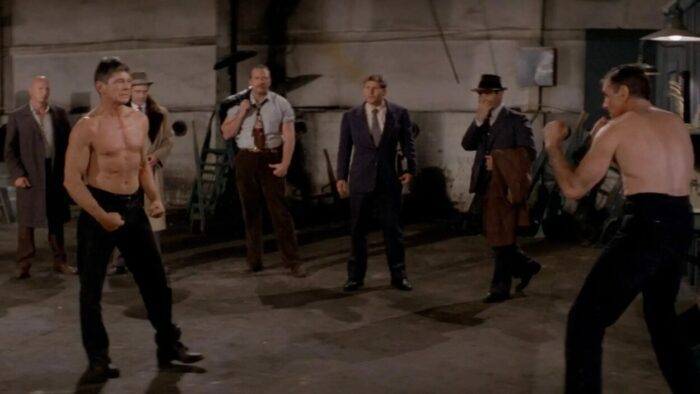
Hard Times is a solid, if unspectacular, debut for Hill. The foundation for his directorial knack of having tough characters in tough situations starts in Hard Times, continuing throughout the rest of his career. Hard Times is the only disc in the set without any features, and as disappointing as that may be, Imprint Films more than makes up for it with the 4K UHD/Blu-ray edition of The Driver.
Similarly to Hard Times and most other films in this set, The Driver is a Walter Hill that escaped me until this box set’s release. But this one was always on my radar as a must-see. I’ve always had an affinity for crime thrillers of the ’70s and was excited to cross off another film from this period. And now that I’ve seen it, The Driver may not have lived up to my loftiest hopes, but a solid, if quirky, ’70s thriller.
Telling the tale of The Driver, like most of the characters in the film, he’s only referred to by a distinguishing identifier. He’s a man of few words, hunted down by a detective: The Detective, who speaks plenty. The two engage in a cinematic “mano a mano,” with The Driver using his wits and driving skills to outmaneuver the dogged officer.
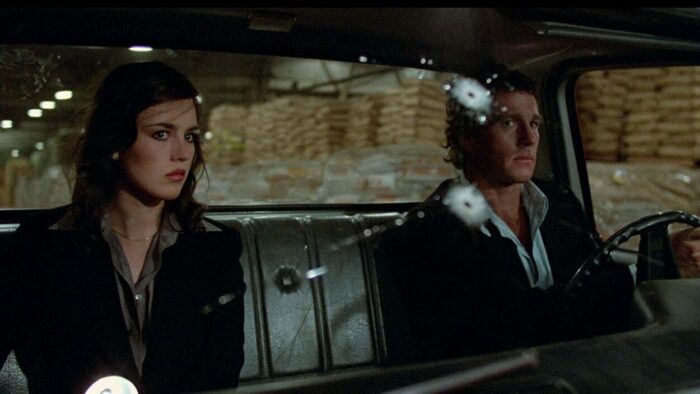
Where Hard Times came up short in the supplemental features department, The Driver makes up for it in spades with a two-disc 4K UHD/Blu-ray affair.
“Cut to the Chase” is a sit-down interview with star Bruce Dern. As with his appearance on the bonus materials for After Dark, My Sweet, this chat is something to cherish. He’s not just a good storyteller but is one of our few living actors left willing to sit down and discuss his work, not just with the film at hand, but with other tales from his life. And this interview does all that and then some.
Dern discusses how he came into acting after his parents wanted him to go into law practice and the struggles with trying to make it in Hollywood of yesteryear. He chats about working with renowned directors such as Walter Hill, Alfred Hitchcock, and Alexander Payne. Even if most of this sit-down details moments outside of The Driver‘s production, I can’t see anyone who wouldn’t enjoy listening to “Cut to the Chase.” There’s also a hilarious story involving Bette Davis that is just perfection.
“Teeth Bared” is an interview conducted with actor Rudy Ramos. Ramos gives off a humble vibe and discusses the production of The Driver as one of the best experiences in his career. He gets into the casting of his role as “Teeth,” a surprise birthday given to him during filming, and the kindness of Walter Hill after a series of surgeries. It’s short and affectionately sweet.
“Simplicity in Motion” is an interview with editor Robert K. Lambert and his work on The Driver. Lambert discusses how he got into the editorial business, working with, then replacing, co-editor Tina Hirsch and his thoughts on editing now versus the “old days.” “Simplicity in Motion” leans heavily into the technical aspects of editing and the laborious nature of such a job; Lambert’s measured tone keeps things from getting too complex or snooze-inducing, making the chat a welcome listen.
“Walter Hill: Masterclass” is an edited-down featurette with the director tracing his career, filmmaking techniques, and thoughts on the Hollywood system. Hill has never shown an embrace physical media releases like a David Fincher or James Cameron, so having the chance to hear his unfiltered opinions on how he approaches a film in general and getting his insight is fascinating and a highlight of the disc.
While I’m not usually a fan of cutting down discussions like this edition of Masterclass, I feel the editing of “Walter Hill: Masterclass” walks a delicate balance with allowing the comments from Hill the chance to resonate and omitting the unnecessary moments that can bog down such an extra with an extended run time that is not needed.
Those looking for the director’s comments on The Driver’s film history rejoice as Imprint Films includes a semi-recently conducted interview by StudioCanal with Walter Hill on the film’s production. Hill discusses his approach to crafting the film’s characters and the actors who played them, using his stylistic influences to make The Driver stand on its own as an action film and the movie’s disappointing reception critically and commercially.
As mentioned earlier, Hill isn’t known for contributing substantial material to a physical media release, so hearing him talk on two separate features is quite the treat! Beyond the film’s production, Hill laments about the change getting a film made in Hollywood then versus now, defending criticism made towards him about the Sam Peckinpah influences throughout his filmography and his chilly relationship with Charles Bronson. Suffice it to say, I adore this interview and could listen to the director tell stories all day.
The disc contains a feature-length audio commentary with film historian and critic Matthew Asprey Gear. Gear is highly-knowledgeable about the film and those involved with the production. He rattles off details about the film’s color designs, the aesthetics of expressing the 1970s themes, and the influences of European cinema weaved within The Driver. While there is some overlap in detail with other features on the disc, this commentary pares well with the wealth of interviews located elsewhere on the Blu-ray. As a side note, the audio commentary is only available on the Blu-ray disc.
Imprint Films also includes an alternate opening—serves different introductions to Isabelle Adjani, Ronee Blakley, and Bruce Dern’s characters. Even with a few good lines thrown in, the start in the finished film works better.
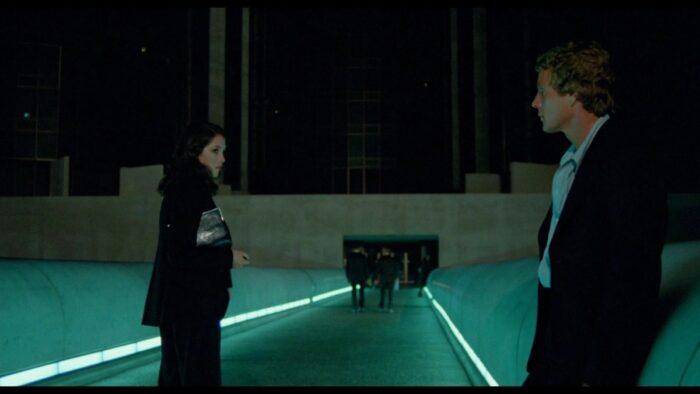
The disc closes out with more teasers than you could ever want to experience, 13 in total, plus the film’s theatrical trailer.
If I’m being honest, the next film in the box set, The Long Riders, is the movie that interested me the least. I have, at best, a checkered history with my enjoyment of Westerns. In my household, I recall a cinematic cowboy adventure playing on our television every weekend. For the longest time, this genre never spoke to me the way comedies, dramas, and action pictures did. Now that I’ve got a bit more mileage, I’ve given the Western genre more opportunities than in my younger days.
And speaking of Younger, The Long Riders is a classic Western tale with an edgy, R-rated Walter Hill slant. What might seem like a PR stunt, casting real brothers as the James, Younger, Miller, and Ford Brothers, works for the film. The chemistry gels well and helps The Long Riders forge its own path in a tale told many times before.
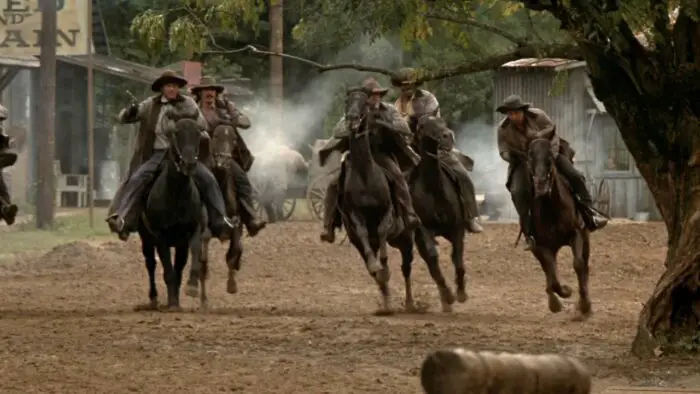
The first feature is a 2017 interview, “The Brothers Carradine,” with Keith and Robert Carradine discussing the film. Both brothers sit together and reminisce fondly about the production of The Long Riders. Keith dominates the interview, detailing how he came aboard the movie and tales from the shoot, while Robert chimes here and there with stories of his own and occasional jokes. It’s a fine enough interview, and nice to see the two brothers sit and enjoy each other’s company.
“The Brothers Keach” is another 2017 interview with James and Stacy Keach. Slightly more balanced than the prior interview, James and Stacy discuss their history with the story that became The Long Riders: first as a play, then the struggle to take the idea to celluloid. Both brothers produced and wrote, along with starring, each offering the most insight into the film’s background. Stacy and James discuss how a photo with the Bridges and Carradine Brothers helped get the ball rolling while also recounting a fascinating tale about how the writing credits came to be. “The Brothers Keach” balances fun and information and is one of the disc’s highlights.
“Brother Randy” is an interview with actor Randy Quaid and his time working on The Long Riders. Unlike the prior sit-downs, Quaid flies solo for a quiet, almost sullen chat. Shot in 2017 during a period when Quaid was making headlines off the screen, it’s intriguing to hear and see his downtrodden demeanor but loving praise for this 1980 film. He discusses his love of Westerns, his once-adversarial-turned-friendship with David Carradine, drinking White Lightning moonshine in Georgia, and the loyal friendship formed with the other actors as they confronted a crew member on set. Oddly, his brother, Dennis, does not come up during the interview. It might be an oversight, but he heaps praise on the rest of the cast and Walter Hill. It is nice to hear from him; regardless of your feelings toward Randy Quaid, I’m appreciative he took some time to reminisce about the movie.
“I Shot Jesse James” is an interview with actor Nicholas Guest. Guest warmly reflects on his time with The Long Riders, working with esteemed Hollywood families, and his appreciation towards David Carradine’s creativity. There’s a gentle nature in the way Nicholas Guest speaks that brings the listener in and makes for a sweet and kind interview.
“Bound by History” finds Walter Hill discussing The Long Riders. I know I mentioned earlier doesn’t participate in many bonus features, so imagine my surprise that there are two films in a row where he dedicates time to chat about his movies. Shot in 2017, Hill discusses how he came aboard the project, the production shoot, his dissatisfaction with losing additional footage that fleshed out the characters, and the impact Sam Fuller had on the film’s knife fight. More interesting, Hill expounds on the historical characters in The Long Riders and working to create a cinematic work of art using actual historical figures. I love listening to Walter Hill and am thankful these interviews made it onto this set.
Composer Ry Cooder sits down to discuss the film’s dazzling score in the interview, “Hold To God’s Unchanging Hand.” Walter Hill thought outside the box when hiring Cooder as the composer for The Long Riders, and the musician discusses the challenges of stepping into such a daunting situation. Cooder gets into his musical history, the difficulties and benefits of working with Walter Hill, and how he composed the movie’s score. Cooder breaks down his musical thought process, and “Hold To God’s Unchanging Hand” makes for an engaging interview.
“Tim Zinnemann on The Long Riders,” producer on the film, discusses his entry into Hollywood and diving into the Western’s production history. While the other interviews speak harmoniously about the movie’s shoot, Zinnemann hints at slight issues regarding the creation process. Zinnemann spouts about multiple script variations by a handful of writers and how the story’s genesis came together. It’s not an unfavorable interview, as he fondly remembers his time with the project, but it slightly contrasts others speaking about The Long Riders.
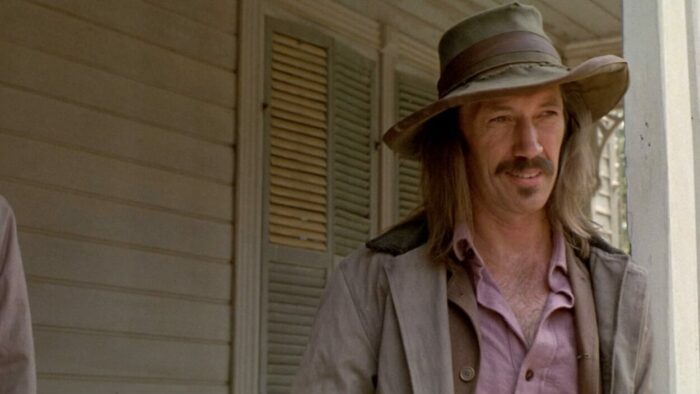
Next is the ten-part documentary, “Outlaw Brothers: The Making of The Long Riders.” Walter Hill, James Keach, and Robert Carradine reflect on the making of The Long Riders. “Outlaw Brothers” was shot before the interviews mentioned, and there is plenty of overlap, but this featurette acts as a one-stop-shop for those looking to gleam the most about the production. While we hear how the picture came about and the filming process, what works best are the actors and director discussing the historical building blocks that formed the script and how they followed or didn’t follow history to make the best movie possible. Considering only three people participate in “Outlaw Brothers,” there’s a lot of good detail and an excellent addition to the disc. The photo referenced in “The Brothers Keach,” featuring Beau and Jeff Bridges, is given time to shine during “Outlaw Brothers.”
“The Northfield Minnesota Raid” is a featurette pulled from the same group behind “Outlaw Brothers,” analyzing the bank robbery scene from The Long Riders. In the same mold as “Outlaw Brothers,” Hill, Keach, and Carradine break down the ins and outs of the violent robbery sequence. Carradine discusses how the bullet wound through Jim Younger’s mouth unfolded, while Hill and Keach discuss the embellishments of the sound and violence and the climatic moment of escape on the characters’ horses. Having “The Northfield Minnesota Raid” featurette on this disc is an excellent compliment to an already stacked disc which, instead of going over the same production information, pinpoints a crucial moment in the film and adds an additional layer of behind-the-scenes info to dive in to.
“Slow Motion: Walter Hill on Sam Peckinpah” is as the title suggests. Hill, culled from the “Outlaw Brothers” session, addresses the usage of slow motion in the Northfield Raid sequence with cries of imitating Sam Peckinpah. Hill relates a call from The Wild Bunch director about how their uses are different and touches upon the prickly nature of Peckinpah. While brief, it’s an amusing slice of Hollywood storytelling and an entertaining little extra feature.
Imprint Films has also included not one but two newly-recorded audio commentaries: one with film historians Howard S. Berger, Steve Mitchell, and Nathaniel Thompson and the second with film historian Toby Roan.
On the track featuring Berger, Mitchell, and Thompson, all three start out stating they are fans of The Long Riders. Each comes to the discussion with plenty of film knowledge mixed with details of America’s Midwest and old west to craft a non-stop conversation alternating between behind-the-scenes information and historical themes. Even if the commentators overlap each other now and again, this is an engaging and persistent audio commentary that fans of The Long Riders will lap up.
The second audio commentary featuring Toby Roan riding solo is a bit more stilted in its delivery, as you can feel Roan reading off a prepared script. The track leans more heavily into the film’s production, occasionally touching historical moments. There are many bits of factoids Roan discusses located elsewhere on this release. Even still, those looking for additional nuggets of The Long Riders can rest assured that the track helps to complement the rest of the supplemental material. I prefer the chat with Berger, Thompson, and Mitchell, but the Roan commentary doesn’t waste your time, either.
Extreme Prejudice is a film that has already appeared in my column, as I reviewed the Vestron Video release. Imprint Films ported over all the extras from that release but went the extra mile and added a few of their own supplemental materials. If you are curious about the prior features, check out Episode 33 of Feature Presentations.
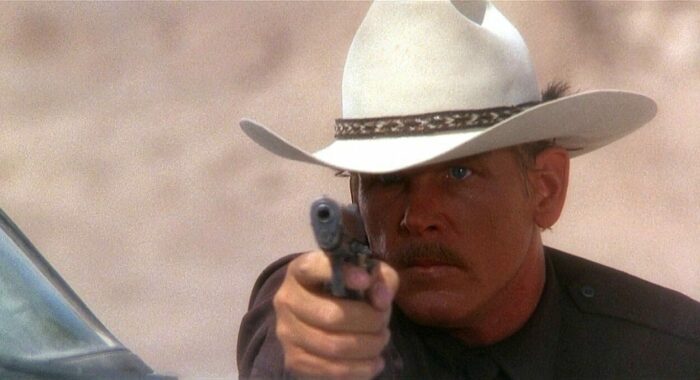
Along with the 2019 interview from the Vestron release, Imprint Films included a 2010 sit-down with director Walter Hill. Much of what Hill discusses here are stories and details mentioned elsewhere in this box set. There are a few bits of fascinating insight. Hill muses on his theory of what actors know about their characters versus what a director knows about the film. He also addresses changes in how television has evolved and the similarities and differences between TV and film production.
Imprint Films also included two newly-recorded audio commentaries: one with film critic and author Walter Chaw and the second with film historians Daniel Kremer and Nat Segaloff.
The solo track with Chaw kicks off, informing the audience that he wrote a book on Walter Hill and Extreme Prejudice as his favorite film. From here, Chaw dives right into the themes that the film presents of helpless cycles that men trap themselves in, whether using derogatory language to bond or not having the outlet to express one’s emotions, resulting in loneliness and death. He also discusses the relationship drama at the core of the movie between Nick Nolte, Powers Boothe, and Maria Conchita Alonso, and the focus on characters doing work and the definition of one’s self. While Chaw occasionally gets a bit quick with his delivery for my liking, this is a well-informed and detailed commentary track that deserves a listen.
The second Imprint track featuring Daniel Kremer and Nat Segaloff eschews the more analytical thematics Chaw dives into and more about the film’s production history and the behind-the-scenes. Kremer and Segaloff discuss how the script by John Milius came about, Nick Nolte’s work prep and lawsuit with a Texas Ranger, the influx of Reagan-era “border movies” throughout the mid-80s, and the politics laced within the script. Kremer and Segaloff have a natural chemistry as they commentate non-stop for the film’s run time. I liked the approach of following through with mostly production history sprinkled with deep-theme analytics; it works well as a counterbalance with the Walter Chaw commentary.
1989’s Johnny Handsome is a film that’s been on my must-see list for many years. A Walter Hill-tinged noir with Mickey Rourke as the titular handsome one? Sign me up! And boy was that something! Leaning a bit more into his over-the-top sensibilities, Johnny Handsome is a slick crime thriller that, as mentioned in the supplemental material, is a bit of a comic book. While it may have been a bit excessive for my liking, I can’t deny that it has an engaging style and an outstanding cast. Something tells me I’ll enjoy this more on a second watch.
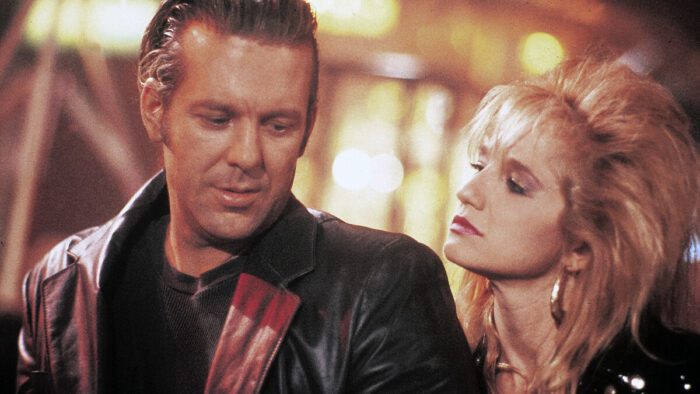
“Codes to Live By” is a 2019 interview with the director about his time with the film. Initially, Hill describes his thoughts about Johnny Handsome, and there’s a sense that he might not be pleased with the finished product. He then gets into how he came aboard the movie, and that initial sense quickly washed away as he lovingly retells the production history. Hill touches on all the primary actors in the film, composer Ry Cooder’s score, adapting the novel for cinemas, a sobering trip to Angola State Prison, and its initially ignored reception. “Codes to Live By” is the lengthiest and most thorough feature on this box set in which Walter Hill discusses one of his projects, and like all his other interviews, I wanted more.
“Wordsmith” is a 2010 interview with the film’s screenwriter, Ken Friedman. Friedman speaks highly about Johnny Handsome as he recalls reading the book once and liking the idea but the five-to-six-year struggle in getting it to screens. There’s an appreciation with the screenwriter that he exudes during the discussion, even when the movie’s lack of success becomes the topic. “Wordsmith” is a brief interview, but worth a watch for Johnny Handsome fans.
“Eye of the Beholder” is a 2010 interview with makeup artist Michael Westmore. For a film as reliant on makeup as Johnny Handsome, it’s appreciated that Imprint Films included this brief discussion with Westmore. He touches upon how he came up with the main character’s facial designs, his recommendations for actors that wear his makeup, and how close his work came to nabbing an Oscar nomination. Westmore appreciates the film and shares that joy throughout “Eye of the Beholder.”
The last interview on the disc, “Action Man,” is with stuntman Allan Graf. Graf recalls how he came into Walter Hill’s orbit with a funny tale of discussing football for an hour and a half before segueing into his time working his way up from stuntman to stunt coordinator and second unit director. He discusses the challenges of filming a car stunt in the French Quarter, shooting in Angola State Prison, and his thoughts on how the film would play if released today.
Imprint Films also includes two commentary tracks: a solo one with film critic and author Walter Chaw and the second with film historians Daniel Kremer and Scout Tafoya.
As mentioned on the track for Extreme Prejudice, Chaw kicks off the discussion with his admiration for Johnny Handsome and director Walter Hill. Chaw then gets into the ideas of masks used within the film and the “mask” of Johnny’s face before and after the surgery. He also talks about Hill’s usage of bridges and prisons while touching upon the allusion to Mickey Rourke and Johnny Handsome‘s faces and the characters measuring themselves between who they are on the inside and whom they project to the outside. I enjoyed this commentary slightly more than Chaw’s turn in Extreme Prejudice, as I felt the details were balanced more and are what good commentaries should be.
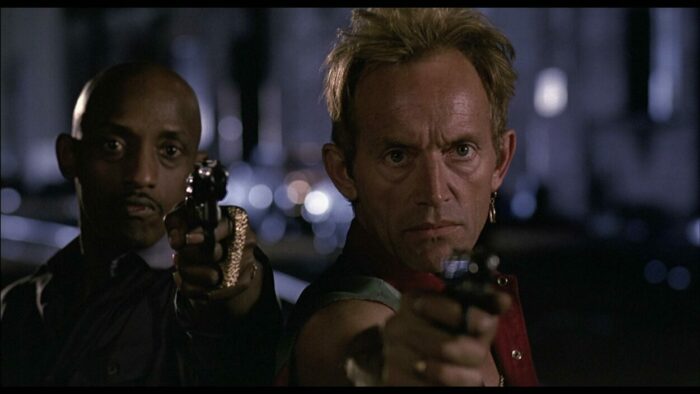
The second track with Daniel Kremer and Scout Tafoya has a welcoming, conversational style, each bouncing production details and analysis off each other. Both men dive into the films Mickey Rourke from his stellar run in the ’80s through his return with The Wrestler and The Expendables. Each dives into a discussion focusing on Walter Hill’s work in Johnny Handsome and his overarching career, sticking within the film’s production for most of this commentary, leaving the analysis to Walter Chaw’s track.
The disc for Johnny Handsome closes out with the theatrical trailer.
The last film on the disc is the 2006 Western miniseries Broken Trail. I remember when this first this TVs on AMC, and I caught bits and pieces of it. As I wasn’t as adeptly in tune with Westerns as I am now, the slow narrative in a genre that didn’t pique my interest meant I didn’t desire to revisit it. After reacquainting myself with Broken Trail, I’m glad I did. Keeping the film as a miniseries and not seeking as many Hollywood conventions as other films in the genre allowed the drama to grow and breathe. Will it be on constant rotation in my house? No, but it is a solid piece of filmmaking led by the continuously outstanding Robert Duvall.
As with how this Walter Hill collection began, this disc closes the box set on a somewhat anticlimactic note. The only feature for Broken Trail is a made-for-AMC documentary made in conjunction with the film. Not entirely an EPK puff piece, we see plenty of behind-the-scenes images and comments from Walter Hill, Robert Duvall, Thomas Haden Church, and many other cast and crew members. There are discussions about the strive for authenticity, this being Robert Duvall’s capper to a Western trilogy of his, the importance of hats (a running theme in this gathering of films), usage of Mandarin, and more. It’s still a talking-head piece of promotional material, but it is absolutely better than average and definitely better than nothing.
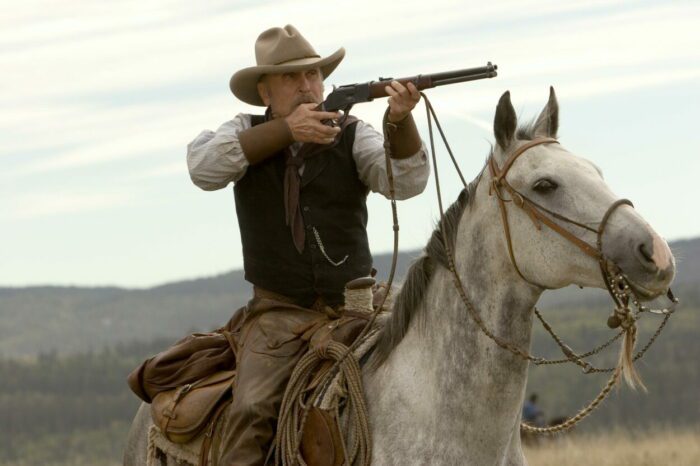
One last thing I want to touch on is the lovely box set that Imprint Films released this Walter Hill box set in. It’s a sturdy case with a removable top on which the six individual films rest. The outside design is a lovely mix of orange and black, featuring images from the movies in this set. It’s a thing of beauty and even better in person.
And there you have it! What a set! As I stated early in this review, over a year has passed from the announcement to the release, and it was worth the wait. Walter Hill is a director that may not get the credit he deserves, but the films in this collection will remind cinephiles why he is such an auteur. As of this writing, the box set is in limited supply, so if you can add this compendium of cinema to your collection, do it. Imprint Films once again knocked it out of the park with the Directed by… Walter Hill box set. I can’t wait to see what else they have in store!




